Following are project summaries from the Innovative Solutions Grants+ Program, as well as the small grants program which preceded it. Thanks to all awardees for your hard work, and for sharing what you’ve learned.
2015 – 2016 Grant Awardees
Arizona-Sonora Desert Museum: Awarded $20,000 to engage university students in Tasting Sustainability, a community-based conservation initiative to increase awareness of seafood sustainability and decrease consumption of unsustainably caught or farmed seafood. Working with Tucson-based group, Lead Local, activities will engage the community, as well as enhance opportunities on the Museum grounds for visitors to help with seafood-related solutions.
National Aquarium: Awarded $25,000 for a project that engages the Hispanic community in a small Baltimore watershed. Through on-the-ground education and leadership training, they will create a network of community members who will spread plastic pollution and marine debris prevention messaging through their neighborhoods and networks. This project will also connect to the Aquarium’s Living Seashore exhibit, which features five Shore Heroes – individuals and groups who have taken action to protect aquatic resources. They plan to develop a sixth Shore Hero, their first with an urban focus, who will make clear the connection between urban waters and the ocean, and as well as set an example for plastic pollution and marine debris prevention.
Saint Louis Zoo: Awarded $15,000 to launch a project directed predominantly by teen volunteers via social media in high school peer networks and with Zoo visitors to tackle the growing issue of plastic pollution and marine debris (100 billion plastic bags are used annually in the United States, with less than 1% recycled). To address these issues in a relevant, actionable manner, staff and Zoo teens will develop a project to reduce plastic bags at Zoo retail locations, within teen volunteer peer networks, and among Zoo visitors. This project has the potential to impact the local community and beyond.
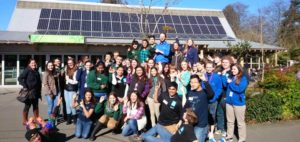
Woodland Park Zoo: Awarded a second year of funding, at $30,000 to expand their leadership role with Seattle Youth Climate Action Network (CAN). CAN was established with ISG+ support in 2014 as an evolution of Woodland Park Zoo, Seattle Aquarium and Pacific Science Center youth programs. Through collective action, these organizations aim engage local teens in effective climate change leadership opportunities. Achieving their vision for Seattle Youth CAN as a replicable model depends upon their ability to continue to integrate new voices, relationships and resources. In 2015-2016, they plan to build upon the existing structure, by expanding the Network and its efficacy through various activities.
2014 – 2015 Grant Awardees
Philadelphia Zoo: Awarded $30,000 to measure the connection between onsite messaging and offsite behavioral change. To quantify the impact of the Zoo’s mission-related conservation-education messaging on visitors, and to link Zoo visitors with ocean issues, they will develop a pilot project that will message ocean acidification (OA) at their Coral Reef Tank exhibit in their new KidZooU: The Hamilton Family Children’s Zoo & Faris Family Education Center. The Zoo will leverage their partnership with PECO – the energy supplier for the Greater Philadelphia region – and Opower, to measure and compare the energy consumption behavior of Zoo visitors who have been exposed to OA messaging and asked to “save energy to save wildlife” with that of non-Zoo visitors, as well as visitors who have not received Zoo interpretation about OA.
Riverbanks Zoo and Garden: Awarded $12,000 to create a year-long immersive program for its ZooTeens. The program, dubbed Teen S.O.S. (Stewards of Our Seas), will feature three main elements: 1.)Teen Action; 2.) Community Action; and 3.) TeenMD (marine debris), the first in a series of S.O.S. action kits. Teens will create innovative art from waterway cleanups and engage in peer-to-peer teaching as they weave the topic of marine debris into interactive programming for guests of all ages and inspire action through a teen-developed “Plastic Pledge – Take Back the Bag” campaign.
The Florida Aquarium: Awarded $28,400 to work with the entire school community of a local Title 1 elementary school where many children are not getting a lot of hands-on science programming and where approximately 50% of the student population report English as a second language. This project will strive to increase participation of students’ families in climate change-related activities and will include development of curricula and related materials in Spanish, that will be shared broadly.
Woodland Park Zoo: Awarded $28,000 to engage their community in climate change, sustainability and conservation action by leveraging the collective energy and enthusiasm of their youth participants. Teens will develop their own carbon reduction action campaign that they will participate in and encourage participation in from their peers. Their project will focus on three primary areas: 1) Training: Develop and implement a comprehensive training/workshop for teens on climate science, interpretive practices, and strategies in developing social marketing/action campaigns and projects; 2) Action: Create the Seattle Youth Climate Action Network made up of teens from WPZ, Seattle Aquarium and the Pacific Science Center. Teen leaders from each will develop and implement their own action campaigns/projects; and 3) Communication: Support teen participants through engaging in a collaborative process that enriches teen experiences within each institution while providing opportunities for them to come together to learn and share throughout the year.
2013 – 2014 Grant Awardees
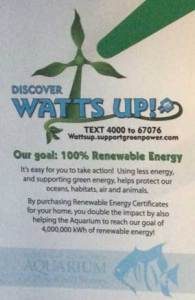
North Carolina Aquarium Society: (Awarded $16,000) The North Carolina Aquariums embarked upon an experimental program to test whether visitors would be interested in purchasing Renewable Energy Certificates (REC) as a way to “go green” and help the ocean and its animals. By using the same “ask” but different approaches at each of their four facilities, they have been able to contrast and compare efforts based not only on the number of RECs purchased, but in visitor and staff experience, as measured with visitor exit surveys and staff interviews. What have they learned so far? They’ve seen that at all sites visitors were interested in the issue of clean energy and welcoming of suggestions about how they can take action, but their most successful approach incorporated interpretive framing techniques – like appealing to shared values, American ingenuity, and future generations – into their auditorium programs and dive shows, where the emphasis was on helping the animals. Also successful, talking about the way in which visitors would be helping the aquarium go green. Less so, efforts that didn’t include interpretation or focused on explaining RECs.
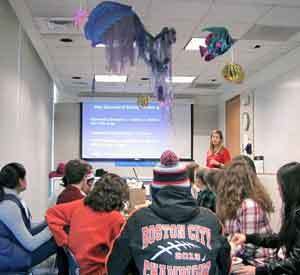 New England Aquarium: (Awarded $17,500) The ClimaTEENS project is helping teens develop climate change presentations for peers. To increase their confidence, the teens have completed in-depth training and developed materials with help from staff experts in climate science and interpretation, and they even presented as part of an Earth Day press event with EPA Administrator Gina McCarthy and Dept. of Energy Secretary Ernest Moniz. Next, the group will be testing whether or not attending one of their presentations increased a visitor’s stated willingness to take one of three “next step” actions.
New England Aquarium: (Awarded $17,500) The ClimaTEENS project is helping teens develop climate change presentations for peers. To increase their confidence, the teens have completed in-depth training and developed materials with help from staff experts in climate science and interpretation, and they even presented as part of an Earth Day press event with EPA Administrator Gina McCarthy and Dept. of Energy Secretary Ernest Moniz. Next, the group will be testing whether or not attending one of their presentations increased a visitor’s stated willingness to take one of three “next step” actions.
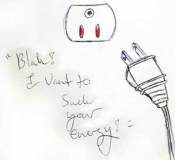 Oregon Coast Aquarium: (Awarded $20,000) The aquarium’s youth volunteers are in the process of creating and implementing a pilot social marketing campaign targeting youth. With a goal of promoting actions by their peers that would help address the issue of ocean acidification, the teens underwent social marketing training to build up their confidence, and then began conducting in-depth interviews with their peers to narrow down what the ask should be. They’ve decided to ask teens to “kill vampires” – appliances that suck energy when plugged in, even if they’re off. Currently the teens are surveying the target demographic to develop a baseline understanding of what teens are currently doing with their game consoles and computers, so later they can evaluate their campaign’s success.
Oregon Coast Aquarium: (Awarded $20,000) The aquarium’s youth volunteers are in the process of creating and implementing a pilot social marketing campaign targeting youth. With a goal of promoting actions by their peers that would help address the issue of ocean acidification, the teens underwent social marketing training to build up their confidence, and then began conducting in-depth interviews with their peers to narrow down what the ask should be. They’ve decided to ask teens to “kill vampires” – appliances that suck energy when plugged in, even if they’re off. Currently the teens are surveying the target demographic to develop a baseline understanding of what teens are currently doing with their game consoles and computers, so later they can evaluate their campaign’s success.
2012 – 2013 Grant Awardees
Brevard Zoo ($10,000) “Zoo Teen’s Youth Environmental Summit” will support an event planned by youth from their Zoo Teen program. Teen leaders will be trained in conservation issues and mentored in event planning. Summit attendees will hear about environmental concerns, attend workshops, meet like-minded peers, participate in hands-on projects and collaborate in small groups. Participants will set goals focused on how they can make a difference for conservation and will be encouraged to share their progress. The Zoo will also develop a ‘handbook’ for best practices for dissemination among The Ocean Project’s partner network.
Monterey Bay Aquarium ($15,000) “Young Women in Science: Ocean Guardians Summer Program” will engage young women, particularly Latinas, in ocean conservation activities. Addressing complex environmental issues like climate change requires a science-literate population, yet nationally women and minorities are underrepresented in the sciences. Many young women are disengaged or discouraged from an interest in the sciences, yet we know youth are the most willing to act on environmental issues. The Monterey Bay Aquarium’s bilingual Ocean Guardians program will address this problem through a variety of activities.
Arizona-Sonora Desert Museum ($15,000) “Desert-Ocean Connections” will utilize two brand new aquarium galleries at the Arizona-Sonora Desert Museum, in Tucson, as the centerpiece for programming that will help Desert Museum visitors and community members appreciate the interdependence of the Gulf of California and Sonoran Desert ecosystems and water resources. The project will develop new interactive interpretive stations for the Desert Museum’s 30 Junior Docents, focused on sustainable seafood and desert waters. Junior Docents will be trained to lead these activities at the Museum and at other community events and will provide visitors with Seafood Watch materials as well as water harvesting tips they can use to be part of the solution right away.
Woodland Park Zoo ($10,000) “Woodland Park Zoo – Climate Change Curriculum” will build on findings from The Ocean Project’s market research to enhance zoo’s existing youth programs. Funding will allow Woodland Park Zoo to develop a new climate change curriculum. Through training and mentoring, it will empower youth to develop and implement conservation action projects. Youth participants will share project results with community members and zoo guests through presentations and social media, encouraging others to join them in taking conservation action.
2011 – 2012 Grant Awardees
Gladys Porter Zoo, $15,000, for “Students Teaching Students: Champions of the Blue”, which partners middle and high school youth with achievement-oriented university students to develop the groundwork for stewardship of the ocean. This program will focus on reaching at-risk, minority teens in Brownsville, which is only 25 miles from the Gulf of Mexico but where many youth know little about its life or threats, and how they can take positive action in their communities.
The Florida Aquarium, $9,975, for “Instilling a Lifelong Conservation Ethic in Middle School Students” which will track classroom outcomes as a result of professional development workshops for middle school teachers who then mentor their students to lead conservation projects at their school.
Fresno Chaffee Zoo, $15,000, for “Teen LEADERS (Lead by Educating with Activities and Demonstrations on the Environment, Resources and Sciences)”. Teen LEADERS will be trained in issues related to ocean and watershed pollution, age-appropriate conservation and stewardship actions and how to successfully facilitate water-focused activities with zoo guests. Training curriculum and activities are designed to 1) inspire first-hand behavior change, 2) create a “ripple effect” of those changes on friends, family and zoo guests.
Lincoln Park Zoo, $15,000, for “Teen-Driven Climate Change Campaigns at Lincoln Park Zoo and Chicago Botanic Garden” to help LPZ and CBG launch youth-driven campaigns to carry climate change messages to a Midwest audience.
New England Aquarium, $15,000, for “Live Blue Ambassadors: Environmental Service Learning for Teens.” This service learning program will inspire and steer teens toward becoming “future ocean protectors” by 1) bringing teens from different backgrounds together to achieve common goals; 2) ensuring teens understand the science behind each project; 3) offering hands-on conservation experience; and 4) encouraging participants to promote environmental protection among their friends, families and communities.
2010 – 2011 Grant Awardees
Aquarium of the Bay, $12,000, to provide professional development for 35 informal science educators and volunteers, evaluate the current call to action, and create a new call to action tool with a local focus. The impacts of climate change will be illustrated through Northern California species, habitats and ecosystems, and produced with a list of easily accomplishable actions with direct ties to the Bay Area.
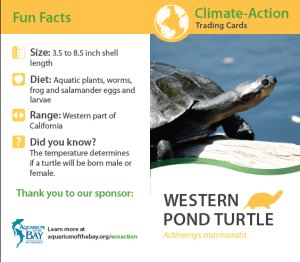
 Utah’s Hogle Zoo, $10,000, to assemble a kit for teachers to use in the classroom to teach their students about climate change. Using animals native to Utah and Alaska students can then understand the similarities and differences, the animal adaptations, and the likely consequences of climate change. The kit also goes one step further, to give the students ways that they can become climate stewards and help have a positive influence on global trends.
Utah’s Hogle Zoo, $10,000, to assemble a kit for teachers to use in the classroom to teach their students about climate change. Using animals native to Utah and Alaska students can then understand the similarities and differences, the animal adaptations, and the likely consequences of climate change. The kit also goes one step further, to give the students ways that they can become climate stewards and help have a positive influence on global trends.
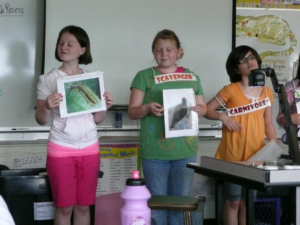
Detroit Zoological Society (DZS), $15,000, for “Tomorrow’s Leaders Today Summer Project” aimed at increasing minority middle school students’ awareness and action on watershed, ocean and climate issues. This informal education demonstration project with the Pontiac Public Schools will increase awareness and understanding of the importance of Great Lakes Watershed conservation and make the important connection between the Great Lakes Watershed and ocean and climate issues through hands-on involvement in water quality testing, invasive species identification and conservation projects at the BINZ.
